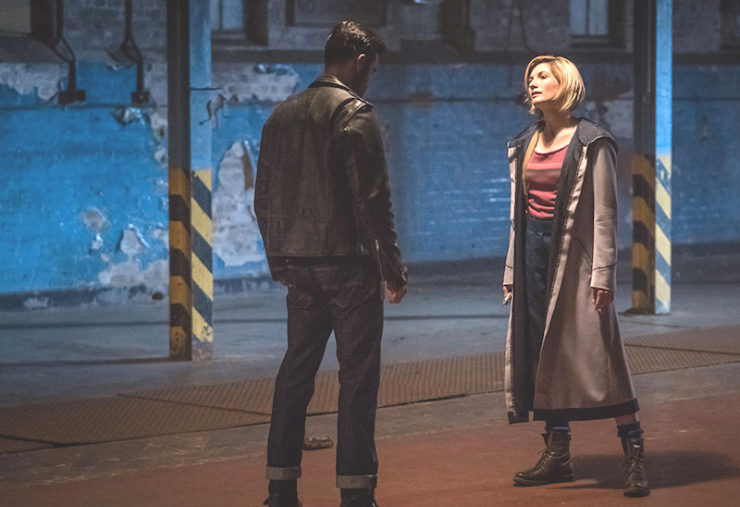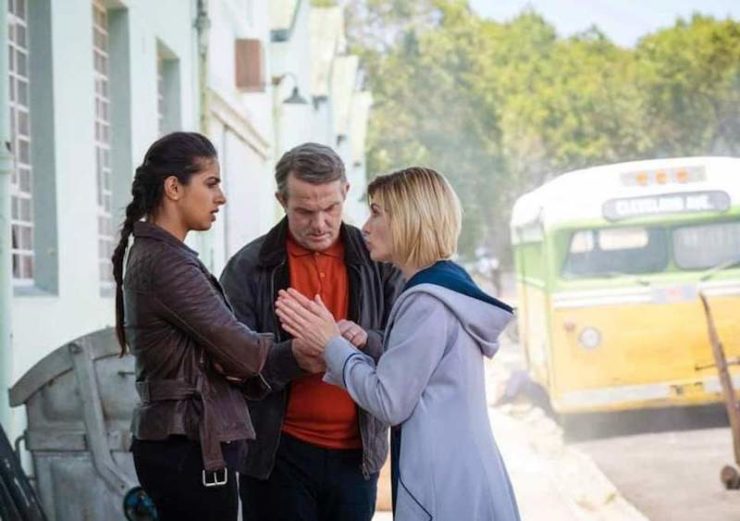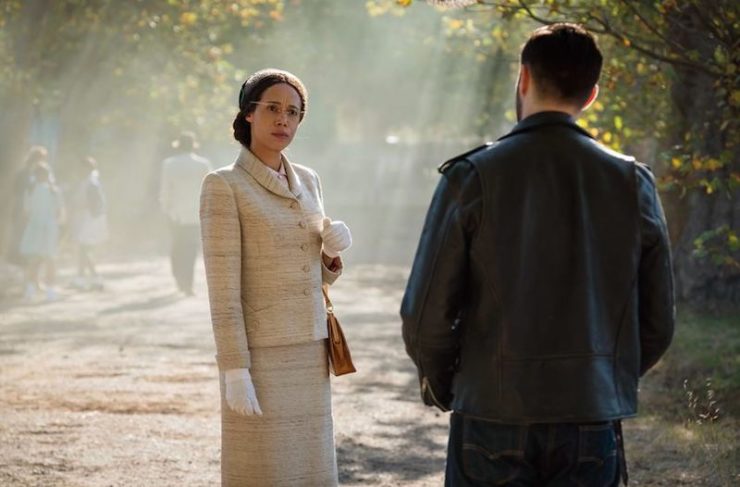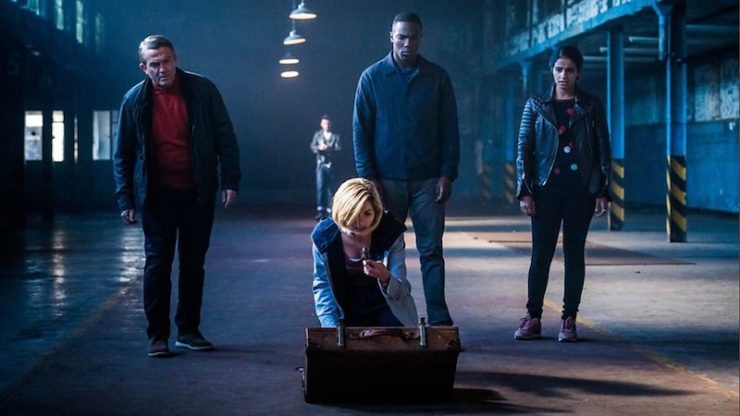There’s no pulling punches when your season’s first trip back to the past is to examine the actions of Civil Rights hero, Rosa Parks. So Doctor Who did not pull those punches. And we are left with a testament to the life of one of the bravest women in American history.
[This review contains an episode recap, so suffice it to say there are SPOILERS.]
Summary
The episode begins with a brief flashback to 1945, when Rosa Parks is kicked off a Montgomery, Alabama bus for entering at the front, where only white people are permitted to enter. Flash forward to 1955, the Doctor and crew have landed in Montgomery due to traces of artron energy the TARDIS is detecting in the area. They go to check it out, but get a rude awakening when Ryan is struck in the face by the white man after he tries to return a dropped glove to the man’s wife. Parks intervenes on their behalf to prevent the situation from escalating, and the Doctor finds traces of artron energy on her. They realize that they have arrived the day before she makes her historic stand on a local bus, which leads to her arrest and starts the bus boycott that sparks the wider Civil Rights Movement in the U.S.
The Doctor traces the artron energy to the local bus depot and finds equipment for a variety of gear from the future, including a temporal displacement weapon. These items belong to a man named Krasko, who turns out to be a recent release from Stormgate prison. He murdered thousands, and the prison only released him after planting an inhibitor in his brain that prevents him from being able to hurt or kill anyone. Without that ability, Krasko decided to jump back in time to “where it went wrong,” to stop Parks’s stand and arrest from taking place. The Doctor realizes that the group needs to do everything in their power to ensure that Parks does exactly has history says—they have to keep the timeline intact.

Krasko tries countless methods of sabotage, from trying to change out the bus driver to breaking down the bus to preventing other passengers from getting on so that it won’t be full. The gang meet him at each turn, foiling him up until the end, when they get on the same bus where Parks makes her stand. They believe they’ve done their work and make to leave, but the Doctor stops them; the bus has to be full enough to ensure that the driver harasses Parks to vacate her seat. They stay and watch her as she refuses to leave and is finally arrested. Once back on the TARDIS, the Doctor tells her companions about the effect Parks had on history.
Commentary
There’s no set up quite like having a companion get assaulted in the first ten minutes of an episode for daring to tap a white woman on the shoulder. In fact, there are many points in this episode that are hard to watch—and that’s as it should be. Racism shouldn’t be easy viewing, even if the intent of the experience is to remind viewers of all the work done and still yet to be done. “Rosa” manages to teach a great deal to those who may not know about Parks and the stand she took on an Alabama bus, but still doesn’t coat it with family-friendly imagery and vocabulary.
In the past, Doctor Who has shuffled back and forth on how much it wanted to address racism. There are episodes that bounce right off it (“The Shakespeare Code”) and episodes where we’ve seen companions antagonized for the color of their skin, though thankfully not brutalized (“Human Nature/Family of Blood”) and there are episodes where racism is crystal clear and criticized (“Thin Ice”)… but this episode is also set in America. Racism functions differently in America, embedded in the origins of the United States and marked by generations of slavery, bigotry, and segregation. This episode needed to be prepared to address that in all its ugliness, and it thankfully didn’t shy away from the issue.

Key to the success of that depiction was the creative team for this episode, co-written by Chris Chibnall with author and former Children’s Laureate Malorie Blackman, directed by Mark Tonderai, and scored by Who’s new composer, Segun Akinola. Having a group of black creators working on this story helped its complexities shine through, rather than leaving us with the sanitized “after school special” on racism, told by white people. The fact that Ryan and Yas are a part of this story helps to highlight the prejudice running throughout; seeing them separated from the Doctor and Graham frequently based on where they can and cannot go is a pointed (and clearly intentional) jab that serves to remind us that the Doctor still has privilege for appearing to be white—which is something that the show could have chosen to gloss over entirely.
Who has helpfully depicted the Doctor learning more and more about how to handle racism in the past decade of its run, and last year’s “Thin Ice” saw the Doctor acknowledge for the first time that his companion, Bill, had reason to be concerned for her safety as a black woman in the past. While the Doctor is oblivious as ever about the general rules anywhere she lands (such as leading her group to sit down in the bar/restaurant where they are angrily told that Ryan and Yas won’t be served), she goes out of her way to let her companions know that she doesn’t expect them to subject themselves to abuse on this journey. She gives them all an out at the start of the episode, suggesting that they wait inside the TARDIS. Later, when Ryan is forced to enter the bus through the back doors, the Doctor tells him it’s wrong and apologizes for how he’s being treated. Not only is this heartening to see but it serves to build a brand new dynamic with this TARDIS crew; there’s more trust here, more mutual respect and consideration.
The villain in all of this is a relatively nondescript angry white man named Krasko, who the Doctor is rightly disgusted and also thoroughly unintimidated by. White supremacists don’t deserve our sympathies or our narrative attention, so the fact that Krasko feels like a cartoon, that he gets little explanations surrounding his beliefs and history seems exactly right. His complexities are irrelevant, should he have any at all. All we really need to know is that he’s a mass murdering racist, who desperately wants to change the past in order to prevent people like him from having to respect the lives of anyone they deem too different.

On the other side is Vinette Robinson’s poised and unshakeable portrayal of Rosa Parks. Though the southern accents throughout the episode get a little wobbly now and then, it’s incredible to see someone bring Parks to life with such intention. When she rescues Ryan from the altercation at the start of the episode that likely would have gotten him killed, it is couched in more history and experience; this is not down to a decision to be non-confrontational, but knowledge of the true cost that comes from even seeming to ignore white privilege. She tells the group about Emmett Till, and warns Ryan not to make that mistake again.
This continues, as the episode follow Ryan and Yas to key into their feelings specifically, and their assessment of how different things truly are in the future. Ryan points out that his grandmother Grace taught him to keep his temper in check as a black man, and he and Yas compare notes on how racism affects their lives. Yas recounts being called racial slurs, even while working as a cop, and Ryan talks about getting stopped by police more often than his white friends. While he bemoans the lack of progress, Yas is a bit more optimistic, noting that without the work of people like Parks, she’d never get to be a police officer.
Later on, Ryan’s chance to spend time with Parks and Dr. King helps him appreciate their work more than he had been able to previously. Both Ryan and Graham talk about Grace in regard to her love of Rosa Parks as an inspirational figure and how she would have reacted to being on this journey with them. (Which really only reinforces the fact that Grace should be there, but I digress yet again on that front.) Yas is forced to confront the specifics of American segregation laws and practices after she is mistaken for a “Mexican,” confused as to whether the word “colored” applies to her in this era, or if it was only meant to apply to black people. The complicated nature of racist systems are shoved into the spotlight, making it difficult for even the Doctor to parse out all the rules. There are tiny moments of protest where she has to use the language of dissent to declare herself against the status quo, and those are equally potent to any of the Doctor’s usual grandstanding; at one point, a local police officer asks if she or Graham have seen “a couple of mongrels” in reference to Ryan and Yas, and the Doctor simply replies, “I don’t recognize anyone by that description.”

The episode is a reflection on how small actions do change the course of history. Krasko knows that whatever ripples outward if Parks doesn’t make her stand will be enough to throw the timeline off completely, and so TARDIS gang have to work nonstop to thwart every wrench he throws in the temporal nexus. In this moment, Team TARDIS is working to safeguard history… which is, fascinatingly, what Time Lords (the Doctor’s species) are technically “meant” to do. But it’s not simply that; in the moment when it counts, the whole group has to stay on the bus in order for it to be crowded enough for Parks to initiate her protest. They are all dismayed to be counted among the people who perpetuate the injustice in the first place, but their comfort is less important than the timeline staying put.
And when that happens, Doctor Who reaffirms that what Rosa Park is the hero of her own story. Because history is correct when she refuses to move on that bus. Nothing needs sorting, nothing needs mending, it just needs to happen the way it did the first time. This story isn’t about the Doctor fixing time and being the hero along with her friends—it’s about the Doctor stepping aside and letting a real hero get to work.
As in other Who episodes where the accomplishments of real people are celebrated (“Vincent and the Doctor”, “The Unicorn and the Wasp”), the Doctor takes a moment at the end to tell her companions what Rosa’s future looks like. She talks about the struggle for rights that never really ended and the Congressional Medal of Honor she received. And then she introduces them to the asteroid named after her—a testament to the fact that doing the work to assure a better tomorrow for the people who depend on your strength and perseverance will land you amongst the stars… even if they weren’t what you were shooting for in the first place.
Asides and notes to keep about the episode:
- Krasko has a vortex manipulator, just like the one that Jack Harkness and River Song used to use.
- Krasko was also being held in Stormcage, the same prison where River Song was held after “murdering” the Doctor.
- The Doctor gave a mobile phone to Elvis, and he still has it. (Which Doctor, I wonder? It sounds like the sort of thing Eleven would do….)
- The Doctor still can’t quite get used to people calling her “ma’am.” It’s hard to blame her. Ma’am is a weird honorific.
- Nothing is funnier than the Doctor teasing Graham repeatedly that she might be Banksy.
Emmet Asher-Perrin wonders how often the Doctor calls up Elvis. You can bug him on Twitter and Tumblr, and read more of her work here and elsewhere.










